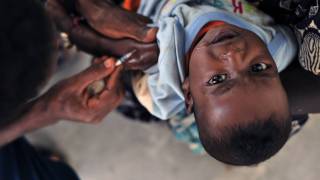Should Vaccine Exemption Laws Be Regulated by the Federal Government?

During an interview with CNN, the head of the US Food and Drug Administration (FDA) Dr. Scott Gottlieb said, ‘that if states don't require more schoolchildren to get vaccinated, the federal government might have to step in.’
Dr. Gottlieb continued saying in an interview with CNN, "Some states are engaging in such wide exemptions that they're creating the opportunity for (infectious disease) outbreaks on a scale that is going to have national implications."
As an example of the FDA’s national role, the FDA has a key role in selecting which influenza strains will be included in seasonal flu vaccines.
The concept of a national policy preventing disease outbreaks is not a new federal government concept.
During 2016, President Obama signed an Executive Order that ensured US leadership and support in strengthening the ability of all countries to detect outbreaks at the earliest possible moment, to respond to them quickly and decisively, and prevent outbreaks wherever possible.
And, the previous director of the National Institute of Allergy and Infectious Diseases (NIAID), Anthony S. Fauci, MD, said during 2017 there is “no doubt” the current administration will be confronted with a surprise infectious disease outbreak.
Dr. Fauci led the NIAID for more than 3 decades, advising the past 5 United States presidents on global health threats. Dr. Fauci said that ‘preventing disease pandemics often starts overseas and that a proper response means collaboration between the US public and private health sectors, and other countries as well,’ reported Healio.
In today’s dynamic, worldwide environment, protection of the human right to exercise informed consent to vaccination continues to be a topic that is of great concern for many people in America.
The US Centers for Disease Control and Prevention (CDC) works closely with public health agencies and private partners to improve and sustain immunization coverage and to monitor the safety of vaccines.
One tool used to maintain low rates of vaccine-preventable disease is state vaccination law.
State vaccination laws include vaccination requirements for children in public and private schools and daycare settings, college/university students, and healthcare workers and patients in certain facilities.
State laws also affect access to vaccination services by determining whether providing vaccinations to patients is within the scope of practice of certain healthcare professionals.
The Public Health Law Program provides selected resources for public health practitioners and their legal counsel on state school vaccination laws.
Recently, the 2018 Annual Report on U.S. State Vaccine Legislation, the non-profit charity National Vaccine Information Center (NVIC) reported that during the 2018 legislative session, no state eliminated or restricted existing medical, religious and conscientious or philosophical exemptions for daycare or school attendance.
Working to prevent vaccine injuries and deaths through public education since 1982, the NVIC is the largest and oldest U.S. charity disseminating information about diseases, vaccines and informed consent to vaccination.
NVIC provides well-referenced, accurate information to the public about vaccination and health, but does not make vaccine recommendations.
Our Trust Standards: Medical Advisory Committee
- FDA chief: Federal government might step in if states don't change lax vaccine laws
- Executive Order -- Advancing the Global Health Security Agenda to Achieve a World Safe and Secure from Infectious Disease Threat
- Trump warned about inevitable infectious disease outbreak
- National Vaccine Information Center


























